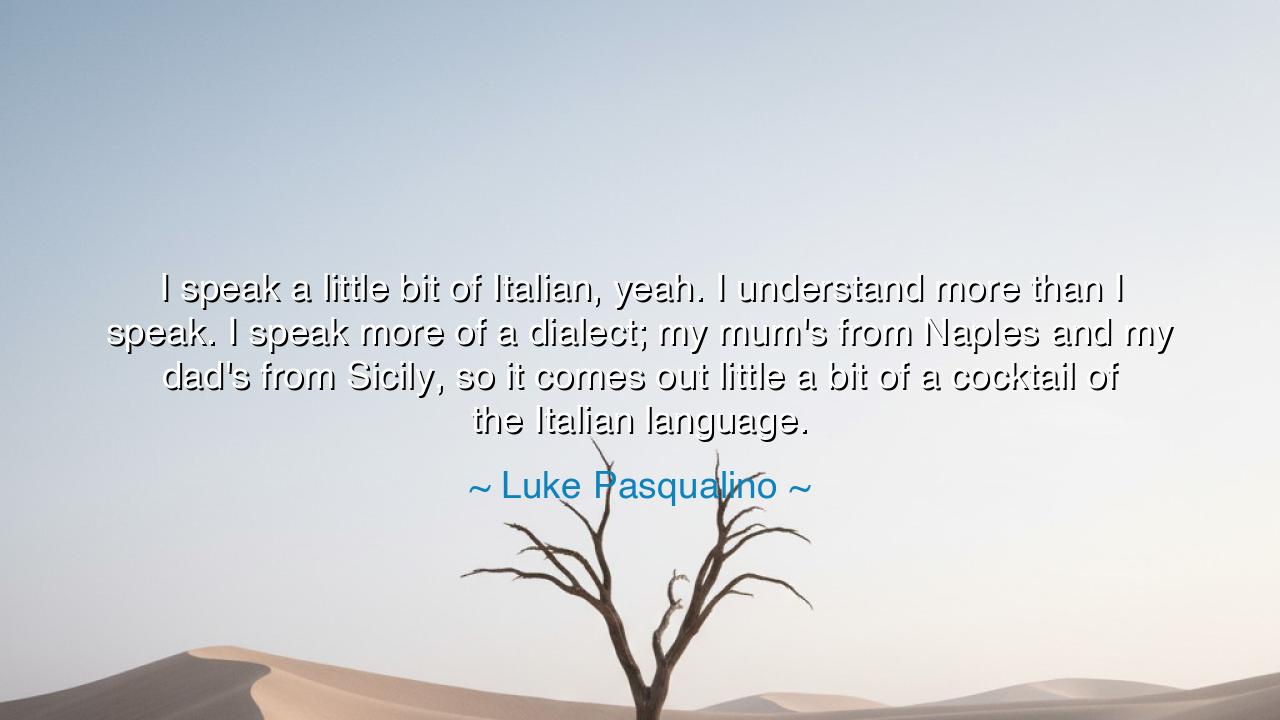
I speak a little bit of Italian, yeah. I understand more than I
I speak a little bit of Italian, yeah. I understand more than I speak. I speak more of a dialect; my mum's from Naples and my dad's from Sicily, so it comes out little a bit of a cocktail of the Italian language.






Hear, O listeners, to the words of Luke Pasqualino, who said: “I speak a little bit of Italian, yeah. I understand more than I speak. I speak more of a dialect; my mum’s from Naples and my dad’s from Sicily, so it comes out a little bit of a cocktail of the Italian language.” Though the words are humble and light, they carry within them a deeper melody—the song of heritage, identity, and the blending of worlds. Beneath this simple statement lies a truth as old as civilization itself: that language is not merely sound, but the bridge of memory that ties us to our ancestors.
Pasqualino’s words tell of a man who stands between lands—the child of Naples and Sicily, born of two proud cultures whose voices have echoed through centuries of sun, sea, and struggle. His dialect, a “cocktail” of the Italian tongue, is not a flaw of speech but a testament to inheritance. It speaks of the way identity flows not in straight lines but in living rivers, mingling and changing as they pass from one generation to the next. In his dialect lives the laughter of the Neapolitan streets, the warmth of Sicilian evenings, and the resilience of a people who have weathered both history and time.
For language is more than words—it is soul made sound. To understand more than one speaks, as Luke confesses, is to live in the half-light between cultures, where the heart feels what the tongue cannot fully express. It is a condition known by millions across the world—the children of immigrants, the heirs of two homelands—those who carry within them the echo of their parents’ voices, even when the words themselves begin to fade. To them, every accent is a memory, every word a thread in the tapestry of belonging.
History abounds with such stories. Consider Marcus Aurelius, the Roman emperor and philosopher. Though his empire stretched across nations, he wrote his meditations not in Latin, but in Greek—the language of his teachers and philosophers. It was the tongue of wisdom, not of conquest. So too, many through time have spoken in dialects not of dominance but of devotion, preserving through speech the heritage of the heart. Pasqualino’s dialect is the same—it is a living vessel of love, the blending of two histories into one human story.
The deeper wisdom of this quote is that identity is not pure—it is composite and evolving, like the Italian dialect Luke speaks of. The modern world often demands we define ourselves within narrow boundaries—one nationality, one language, one origin—but the truth of humanity has never been so simple. We are all mixtures of dialects and destinies, born of many influences. To speak imperfectly, to blend tongues and traditions, is not weakness—it is the natural state of a world that has always been connected.
And yet, this “cocktail of language” also teaches humility. Luke admits he understands more than he speaks—a metaphor for the human condition itself. For who among us truly speaks all that we understand? We feel deeply, we inherit stories, and yet our words can never fully contain them. His confession becomes a poetic reminder that understanding is greater than expression, and that sometimes love, culture, and connection are felt more deeply than they can ever be spoken.
The lesson, then, is one of reverence for one’s roots. Do not despise the imperfect language of your inheritance, for within its irregularities lies your soul. Cherish the dialects, the customs, the small stories that shaped your blood. Speak them when you can, and when you cannot—listen. For understanding, even without perfect speech, is a form of love.
Thus, from the humble words of Luke Pasqualino, we draw a timeless truth: that our identities are symphonies composed by those who came before us. Every dialect, every accent, every blended word is an offering to ancestry. And in remembering this, we honor not only where we came from—but who we are still becoming.






AAdministratorAdministrator
Welcome, honored guests. Please leave a comment, we will respond soon